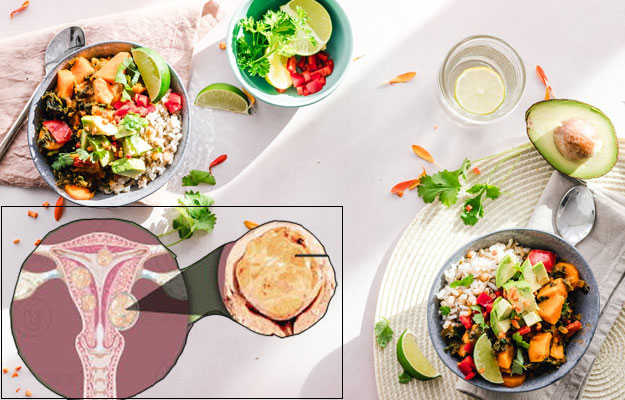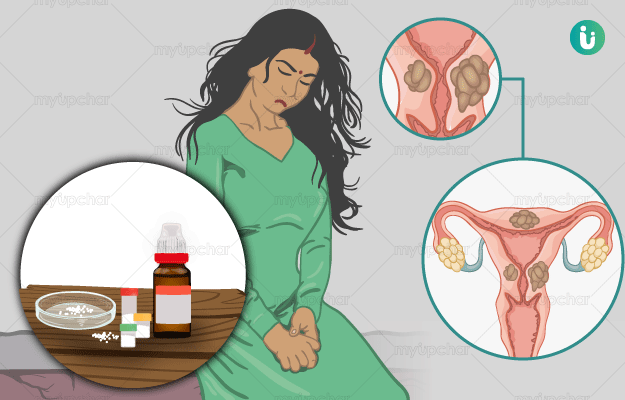Uterine fibroids, or leiomyomas or myomas, are benign tumours of the uterus composed of smooth muscle and connective tissue. Fibroids are the most common pelvic tumour in females. Most women develop some degree of fibroids in their lifetimes.
(Read more: What is the difference between a tumour and cancer?)
Most uterine fibroid cases are asymptomatic. However, symptoms may include abnormal uterine bleeding, resulting in prolonged or heavy periods and possibly, anaemia, dysmenorrhea (pain during periods), increased urinary frequency and urgency, constipation, dyspareunia (difficult or painful sexual intercourse), and abdominal tenderness. Fibroids in the uterus are the most common reason for a hysterectomy.
Dietary changes can help you manage the complications of the disease, and even lower the risk of developing fibroids. In this article, we will discuss such changes you should make to your diet and share a diet plan that is easy to follow:
- Foods to reduce uterine fibroids complications
- Vegetables and other vegetarian food for Uterine fibroids
- Fruits to control uterine fibroids
- Other useful foods for Uterine fibroids
- Avoid these foods to control uterine fibroids
- Indian diet plan for uterine fibroids
Foods to reduce uterine fibroids complications
Some complications of uterine fibroids are observed quite commonly across patients. Making the correct changes to your diet can help manage these well, or even help you prevent them entirely.
Diet to maintain a healthy weight in uterine fibroids
Weight gain is commonly associated with uterine fibroids. Most studies suggest that higher BMI and weight gain in adulthood are associated with a higher risk of the disease.
So check your BMI and if you are coming in the overweight or obese category, it’s time to reduce your weight. Even otherwise, it’s a good idea to maintain a healthy weight by watching your calorie intake and adopting a diet high in fibre and protein. To do this, add lentils, eggs, milk and milk products, lean meat, and all colourful fruits and vegetables in natural form.
(Read more: Healthy foods to lose weight)
Food to treat anaemia in uterine fibroids
Due to heavy menstrual flow, anaemia is commonly seen in patients with uterine fibroids. If you are anaemic or see symptoms of it, you should regularly check your haemoglobin level, vitamin B12 level, and iron level in the blood. If you are deficient in these nutrients, consult with your nutritionist for a customized diet plan according to your reports.
(Read more: Home Remedies for Anaemia)
If you want to avoid anaemia, add green leafy vegetables, sprouts, dates, fig, egg yolk, and fermented foods to your diet.
(Read more: Anemia diet)
Vegetables and other vegetarian food for Uterine fibroids
Studies have shown that significant consumption of red meats or ham is associated with an increased risk of fibroids. On the other hand, the consumption of vegetarian foods (green vegetables and fruits) has been found to be associated with a decreased risk. So plan your diet accordingly. One way of doing this is to adopt a Mediterranean diet. Alternatively, add all the essential nutrients through vegetarian options such as:
- For energy, take whole grains
- For protein, take pulses, legumes, milk, and milk products
- For fat, plant-based fat such as sunflower oil, olive oil, flaxseed oil and nuts
- For vitamins and minerals, all fruits and vegetables
Some vegetables can improve the symptoms of this disease, such as:
-
Cruciferous vegetables: research suggests that increasing the intake of cruciferous vegetables (such as cabbage, broccoli, turnip, mustard greens, and cauliflower) can be helpful to control uterine fibroids. This group of vegetables contains indole-3-carbinol, which may prevent estrogen-driven tumours due to its effect on estrogen metabolism.
-
Green leafy vegetables: There is evidence that taking folic acid (vitamin B9) and fiber can be helpful in controlling the symptoms of fibroids. Green leafy vegetables such as spinach, fenugreek leaves, amaranth leaves, beetroot, and beetroot greens are rich sources of folic acid. Add them to your salad, soup, curry, or lentils. (Read more: Vitamin B9 deficiency symptoms)
Fruits to control uterine fibroids
Some fruits have also been found to be helpful in uterine fibroids, such as those rich in vitamin A and citrus fruits. Here’s why and which fruits to add to your diet:
-
Vitamin A-rich fruits: fruits rich in vitamin A (known as a strong antioxidant), can be helpful in shrinking fibroids. So add all red, orange and yellow fruits such as apple, papaya, carrot and watermelon to your daily diet. (Read more: Vitamin A deficiency symptoms)
-
Citrus fruits: Citrus fruits are rich in vitamin C, which is known to control uterine fibroids. You can have grapefruit, oranges, lemon to fulfil your daily vitamin c requirement. It’s better to eat the fruits instead of juicing them. (Read more: Vitamin C deficiency symptoms)
Other useful foods for Uterine fibroids
Research on the dietary implications of uterine fibroids has shown that green tea can be quite helpful, as is maintaining the correct amount of vitamin D level in your body.
Uterine fibroids and green tea
Green tea is rich in polyphenols, which are natural compounds that have multiple health benefits, such as reducing inflammation and helping to fight cancer. It is also known as a great compound to reduce the size of fibroids.
In a study of 39 women, fibroid volume increased by 24.3% over the study period in the group receiving a placebo (the control group), whereas patients who received green tea extract showed a significant reduction (32.6%) in total uterine fibroid volume. So, try to take at least 1 cup of green tea every day, or at the very least you can start by taking a green tea extract capsule. Be sure to discuss this with your doctor first though.
(Read more: Green tea benefits)
Vitamin D rich food to decrease the risk of uterine fibroid
Research has provided evidence that an adequate vitamin D level in the body is associated with a reduced risk of uterine fibroids. Here are some foods rich in vitamin D:
- Egg yolks
- Fortified milk, cheese, and dairy products
- Fortified cereals
- Fortified fruit juice
- Fatty fish
- Cod liver oil
You can also discuss taking a vitamin D supplement with your doctor.
(Read more: Vitamin D deficiency symptoms)
Avoid these foods to control uterine fibroids
Eliminating some foods can be helpful in controlling the symptoms of uterine fibroids such as processed foods, red meat and alcoholic beverages. Here’s why and what to substitute them with:
Avoid processed food: Several studies have found that taking processed foods can increase the inflammation level in the body, which can increase the size of the fibroid and worsen the symptoms. Eliminate all the packaged and processed food, such as:
- Chips
- Jam
- Jelly
- Namkeen
- Biscuits
- Ready to eat food
Instead of taking these foods, go for nutrient-rich, freshly home-cooked meals.
Avoid red meat: According to clinical studies, eating too much red meat increases your risk of uterine fibroids. So try to avoid pork, mutton and other red meats.
Say no to alcohol: Drinking any type of alcoholic beverage may increase your risk for fibroids. This can happen because alcohol increases the level of hormones needed for fibroids to grow. Alcohol may also trigger inflammation which can worsen the symptoms of this disease.
A study found that women who drank one or more beers a day increased their risk by more than 50 percent. Avoid or limit alcohol to help reduce your risk. (Read more: How to quit alcohol)
Indian diet plan for uterine fibroids
Here is a sample Indian diet plan for women with uterine fibroids. It not only combines all the dietary advice given above, but it is also very easy to follow as it comprises easily available foods. If the foods mentioned here are not to your taste, you create a customized diet plan with your nutritionist:
- Early morning: lukewarm water with lemon (1 glass) + almonds (6-7) + raisins (8-10)
- Breakfast: besan paneer cheela (2) + green chutney (2 tbsp)
- Mid meal: apple (1 medium)
- Lunch: chapati (2) + moong daal (1 bowl) + bottle gourd curry (1 bowl) + salad (1 small plate)
- Evening tea: green tea (1 cup) + roasted chana (1-2 handful)
- Dinner: vegetable soup (1 bowl) + multigrain chapati (2) + toor daal (1 bowl) + any season green vegetable (1 bowl)
- Bedtime: turmeric milk (1 cup)
(Read more: Homeopathic medicines for uterine fibroids)
Find Nutritionist in cities
Doctors for Uterine Fibroids Diet

Dr. Dhanamjaya D
Nutritionist
16 Years of Experience

Dt. Surbhi Upadhyay
Nutritionist
3 Years of Experience

Dt. Manjari Purwar
Nutritionist
11 Years of Experience

Dt. Akanksha Mishra
Nutritionist
8 Years of Experience
References
- Flake GP, et al. Etiology and pathogenesis of uterine leiomyomas: a review.. Environ Health Perspect. 2003 Jun; 111(8): 1037-54. PMID:12826476
- Shen Yang, et al. Vegetarian diet and reduced uterine fibroids risk: A case-control study in Nanjing, China. J Obstet Gynaecol Res. 2016 Jan; 42(1): 87-94. PMID:26458740
- Wise LA, et al. Intake of fruit, vegetables, and carotenoids in relation to risk of uterine leiomyomata.. Am J Clin Nutr. 2011 Dec; 94(6): 1620-31. PMID:22071705
- Ciebiera Michał et al. Vitamins and Uterine Fibroids: Current Data on Pathophysiology and Possible Clinical Relevance. Int J Mol Sci. 2020 Aug; 21(15): 5528. PMID: 32752274
- Baird Donna Day et al. Vitamin d and the risk of uterine fibroids. Epidemiology. 2013 May; 24(3): 447-53. PMID: 23493030
- Ciebiera Michał, et al. Vitamins and Uterine Fibroids: Current Data on Pathophysiology and Possible Clinical Relevance. Int J Mol Sci. 2020 Aug; 21(15): 5528. PMID: 32752274
- Roshdy Eman et al. Treatment of symptomatic uterine fibroids with green tea extract: a pilot randomized controlled clinical study. Int J Womens Health. 2013; 5: 477–486. PMID: 23950663












